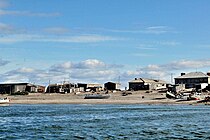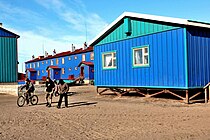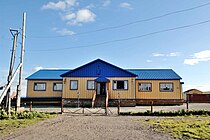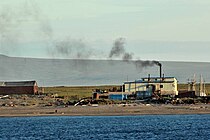Neshkan, Russia
Neshkan
Нешкан | |
|---|---|
| Coordinates: 67°03′N 173°01′W / 67.050°N 173.017°W | |
| Country | Russia |
| Federal subject | Chukotka Autonomous Okrug[1] |
| Administrative district | Chukotsky District |
| Founded | Mid 1950s[2] |
| Population | |
• Total | 704 |
• Estimate (January 2016)[5] | 637 |
| • Municipal district | Chukotsky Municipal District[6] |
| • Rural settlement | Neshkan Rural Settlement[6] |
| • Capital of | Neshkan Rural Settlement[6] |
| Time zone | UTC+12 (MSK+9 |
| Postal code(s)[8] | 689330 |
| Dialing code(s) | +7 42736[9] |
| OKTMO ID | 77633430101 |
Neshkan (Template:Lang-ru; Chukchi: Ӈэсӄэн; Naskuk in the Yupik language, meaning head of a ringed seal after a nearby hill[10]) is a rural locality (a selo) in Chukotsky District of Chukotka Autonomous Okrug, Russia.[1] It is located on the shores of the Chukchi Sea on a sandy spit that divides Neskynpil'gyn Lagoon from the sea, close to Idlidlya Island. Population: 704 (2010 Census);[3] Municipally, Neshkan is subordinated to Chukotsky Municipal District and incorporated as Neshkan Rural Settlement.[6]
History
Like many other villages in Chukotka, Neshkan was founded as a result of Soviet economics. In the 1950s, attempts to unify the itinerant reindeer herders of the area, consisting of the Nuteikvyn, Anayan, Tolgunen, and Vylkarney amongst others into a collective farm led to the creation of the village.[11] The village took its name from the Chukchi word Naskuk, meaning "Seal's Head", so called because one of the mountains surrounding the village looks like a seal's head when viewed from the sea.[10]
Neshkan has seen some benefit in recent years from the money that has been generated by the exploitation of the oil and gas present in the area, as a number of multi-story houses were built in the village in 2005.[12]
The Vega Expedition, the first Arctic expedition to navigate through the Northeast Passage, had to winter from September 1878 to July 1879 in a point (67º 4' 49" North, 173º 23' 2" West) near Neshkan.
Economy
Unlike such villages as Tavayvaam, which have suffered serious economic hardships since the dissolution of the Soviet Union, when all the reindeer owned by the villagers were lost, leading to continuing high unemployment in the area, Neshkan's economy is still dominated by reindeer herding, with there being six separate herds maintained by the villagers, though this is also supplemented by fishing.[11]
However, the village still endures considerable economic isolation as a result of its geography. Only pensioners are paid in cash, while almost all other transactions are barter or coupons (which are often paid to state employees in the region in lieu of cash). What cash is available is spent on necessary supplies, which, due to the isolation of the village and the resulting difficulties in transporting food and other supplies, is often nearly double the price found elsewhere in the region.[13]
Demographics
The village is small, with a population of 704 according to the most recent census results,[3] split equally between men and women,[3] and a reduction on an estimated 2009 population of 720 people,[2] itself a slight increase on the estimated 2003 population of 704 inhabitants (662 of them indigenous people).[10]
Transport
Neshkan is 250 km from the district centre Lavrentiya.[2]
Air
There are weekly flights from Lavrentiya to the village and the only other means of getting there is a four- to five-day off-road journey.[11]
Road
Like almost all Chukotkan settlements, there is no direct link from the village to any other settlement by permanent road. There is however, a small network of roads within the settlement including:[14]
- Улица 50 лет Великого Октября (Ulitsa 50 Let Velikogo Oktyabrya, lit. 50 Years of October Street)
- Улица Берзиня (Ulitsa Berzinya, lit. Berzin Street)
- Улица Гагарина (Ulitsa Gagarina, lit. Gagarin Street)
- Улица Комсомольская (Ulitsa Komsomolskaya, lit. Komosomol Street)
- Улица Набережная (Ulitsa Naberezhnaya, lit. Quay Street)
- Улица Полярная (Ulitsa Polyarnaya, lit. Polar Street)
- Улица Строителей (Ulitsa Stroiteley, lit. Builder's Street)
- Улица Строительная (Ulitsa Stroitelnaya, lit. Construction Street)
- Улица Тундровая (Ulitsa Tundrovnaya, lit. Tundra Street)
- Улица Центральная (Ulitsa Tsentralnaya, lit. Central Street)
Climate
Neshkan has a Tundra climate (ET)[15] because the warmest month has an average temperature between 0 °C (32 °F) and 10 °C (50 °F).
| Climate data for Neshkan | |||||||||||||
|---|---|---|---|---|---|---|---|---|---|---|---|---|---|
| Month | Jan | Feb | Mar | Apr | May | Jun | Jul | Aug | Sep | Oct | Nov | Dec | Year |
| Record high °C (°F) | 2 (36) |
3.9 (39.0) |
3.8 (38.8) |
21.2 (70.2) |
12.8 (55.0) |
24 (75) |
19.9 (67.8) |
22 (72) |
10.2 (50.4) |
9.6 (49.3) |
8 (46) |
13 (55) |
24 (75) |
| Mean daily maximum °C (°F) | −13.2 (8.2) |
−14.7 (5.5) |
−15.9 (3.4) |
−11 (12) |
−2.1 (28.2) |
3.5 (38.3) |
7.2 (45.0) |
6 (43) |
2 (36) |
−1.9 (28.6) |
−7.8 (18.0) |
−12.6 (9.3) |
−5 (23) |
| Mean daily minimum °C (°F) | −15.7 (3.7) |
−18.5 (−1.3) |
−19.3 (−2.7) |
−14.6 (5.7) |
−4.4 (24.1) |
0.9 (33.6) |
4.3 (39.7) |
3.7 (38.7) |
0.7 (33.3) |
−3.5 (25.7) |
−9.7 (14.5) |
−14.4 (6.1) |
−7.5 (18.5) |
| Record low °C (°F) | −41 (−42) |
−42 (−44) |
−35.5 (−31.9) |
−34.2 (−29.6) |
−22.3 (−8.1) |
−7.7 (18.1) |
−4 (25) |
−9 (16) |
−7.4 (18.7) |
−24.3 (−11.7) |
−30.8 (−23.4) |
−36.2 (−33.2) |
−42 (−44) |
| Average rainfall mm (inches) | 0 (0) |
0 (0) |
0 (0) |
0 (0) |
0 (0) |
3 (0.1) |
0 (0) |
3 (0.1) |
3 (0.1) |
3 (0.1) |
3 (0.1) |
0 (0) |
15 (0.6) |
| Average snowy days | 15 | 10 | 10 | 14 | 14 | 4 | 0 | 1 | 6 | 18 | 20 | 13 | 125 |
| Source: [16] | |||||||||||||
Earthquakes
Neshkan experienced a number of earthquakes throughout the 20th century, including several quakes during 1928 measuring 7.7 on the Richter Scale[17] and a number measuring between 5 and 6 throughout the second half of the century. At the time that these regular earthquakes began to affect the village, there was a lack of seismic stations in the okrug. In 2002, Bilibino was the site of the only working seismic station in the region and was over 700 km away. Prior to this, there had been a seismic station in Iultin, but this was still over 200 km away and neither was close enough to any epicentre to draw out any trends.[18]
In response to these earthquakes and the growing complaints from the inhabitants of Neshkan a permanent station was established in the village, which detected over 150 small quakes in little more than eighteen days,[19] leading geophysicists to suggest that the quakes have been caused by a previously unknown fault extending across this part of Chukotka, a view strengthened by the linear pattern of the quakes and the presence of hot springs in places like Lorino.[20]
The local toponymy suggests a more longstanding association between the indigenous people, with many geographical objects having names which conjure images of earthquakes such as the mountains Elyulivoigyn, Ivuichin, and Eletkun, meaning "shivering", "moving", and "dancing" mountain respectively, as well as nearby lake names such as Einekuem, meaning "buzzing lake".[21]
These earthquakes have been attributed to the newly theorised Loloveem Fault, which runs from Cape Neshkan, where the village is situated, in a south-southwesterly direction through Neskynpilgyn Lagoon and Innuloon Lagoon.[22]
Photo gallery
-
Neshkan (Chukotka, Russia;
67°2‘15’’N, 172°57’50’’W) -
Neshkan, street scene
-
Neshkan, schoolhouse
-
Neshkan, heating plant
See also
References
Notes
- ^ a b c d Law #33-OZ, Article 13.2
- ^ a b c Муниципальное образование сельское поселение Нешкан Municipal Formation of the rural Settlement of Neshkan - Official Chukotksky District Website
- ^ a b c d Russian Federal State Statistics Service (2011). Всероссийская перепись населения 2010 года. Том 1 [2010 All-Russian Population Census, vol. 1]. Всероссийская перепись населения 2010 года [2010 All-Russia Population Census] (in Russian). Federal State Statistics Service.
- ^ The results of the 2010 Census are given for Neshkan Rural Settlement, a municipal formation of Chukotsky Municipal District. According to Law #148-OZ, Neshkan is the only inhabited locality on the territory of Neshkan Rural Settlement.
- ^ Chukotka Autonomous Okrug Territorial Branch of the Federal State Statistics Service. Численность постоянного населения Чукотского автономного округа по муниципальным образованиям на 1 января 2016 года Template:Ru icon
- ^ a b c d Law #47-OZ, Article 4
- ^ "Об исчислении времени". Официальный интернет-портал правовой информации (in Russian). 3 June 2011. Retrieved 19 January 2019.
- ^ Pochtovik Mail Delivery Service Chukotsky District Template:Ru icon
- ^ Ministry of Justice of the Russian Federation Archived 2012-02-08 at the Wayback Machine Chukotsky District Template:Ru icon
- ^ a b c Red Cross of Chukotka. Chukotsky District (Archived)
- ^ a b c Strogoff, p. 120f
- ^ Official website of Chukotsky District
- ^ East West Institute. Russian Regional Report, Vol. 4, No. 1, 14 January 1999
- ^ Neshkan - Chukotsky District - Pochtovik Mail Delivery Service
- ^ McKnight and Hess, pp.235-7
- ^ "Weather Averages for Neshkan from meoweather.com". meoweather.com. Retrieved October 2, 2012.
- ^ Mackey et al., p. 9
- ^ Mackey et al., p. 1
- ^ Mackey et al., p. 5
- ^ The Smithsonian/NASA Astrophysics Data System. A Seismic Swarm Near Neshkan, Chukotka, Far Northeastern Russia
- ^ Mackey et al., p. 7f
- ^ Mackey et al., Fig. 4
Sources
- McKnight, Tom L; Hess, Darrel (2000). "Climate Zones and Types". Physical Geography: A Landscape Appreciation. Upper Saddle River, NJ: Prentice Hall. ISBN 0-13-020263-0.
- Дума Чукотского автономного округа. Закон №33-ОЗ от 30 июня 1998 г. «Об административно-территориальном устройстве Чукотского автономного округа», в ред. Закона №55-ОЗ от 9 июня 2012 г. «О внесении изменений в Закон Чукотского автономного округа "Об административно-территориальном устройстве Чукотского автономного округа"». Вступил в силу по истечении десяти дней со дня его официального опубликования. Опубликован: "Ведомости", №7 (28), 14 мая 1999 г. (Duma of Chukotka Autonomous Okrug. Law #33-OZ of June 30, 1998 On the Administrative-Territorial Structure of Chukotka Autonomous Okrug, as amended by the Law #55-OZ of June 9, 2012 On Amending the Law of Chukotka Autonomous Okrug "On the Administrative-Territorial Structure of Chukotka Autonomous Okrug". Effective as of after ten days from the day of the official publication.). Template:Ru icon
- Дума Чукотского автономного округа. Закон №47-ОЗ от 29 ноября 2004 г. «О статусе, границах и административных центрах муниципальных образований на территории Чукотского района Чукотского автономного округа». Вступил в силу через десять дней со дня официального опубликования. Опубликован: "Ведомости", №31/1 (178/1), 10 декабря 2004 г. (Duma of Chukotka Autonomous Okrug. Law #47-OZ of November 29, 2004 On the Status, Borders, and Administrative Centers of the Municipal Formations on the Territory of Chukotsky District of Chukotka Autonomous Okrug. Effective as of the day which is ten days after the official publication date.). Template:Ru icon
- K. G. Mackey, K. Fujita, B. M. Sedov, L. V. Gounbina and S Kurtkin A seismic swarm near Neshkan, Chukotka, northeastern Russia and implications for the boundary of the Bering plate, 2009. Michigan State University.
- Strogoff, M, Brochet, P-C and Auzias, D. Petit Futé: Chukotka, "Avant-Garde" Publishing House, 2006.







